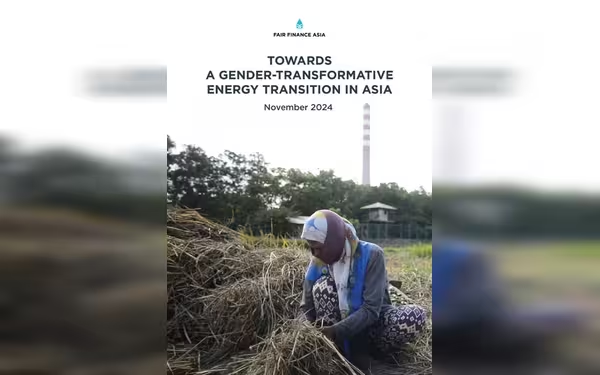Wednesday, January 15, 2025 05:34 PM
ADB's Gender Gaps in Indonesia's Energy Transition Mechanism
- Fair Finance Asia highlights gender gaps in ADB's ETM.
- Cirebon 1 project lacks women's participation in decision-making.
- Urgent need for gender-disaggregated data in energy transition.
 Image Credits: prnewswire_apac
Image Credits: prnewswire_apacFair Finance Asia reveals critical gender gaps in ADB's Energy Transition Mechanism in Cirebon, Indonesia, urging inclusive decision-making.
The Asian Development Bank (ADB) has recently come under scrutiny for its Energy Transition Mechanism (ETM) pilot project in Cirebon, Indonesia. Launched on November 27, this initiative aims to facilitate the early retirement of coal-fired power plants (CFPPs) to promote cleaner energy sources. However, a new assessment by Fair Finance Asia (FFA) has highlighted significant gaps in how gender considerations are integrated into this project. The report emphasizes the need for a more inclusive approach that actively involves women and marginalized groups in the decision-making processes surrounding energy transitions.
FFA's assessment identifies Cirebon 1 as a crucial case study for evaluating the ADB's ETM model. The organization urges the ADB to address the critical gaps in gender considerations, which are essential for ensuring that the energy transition is equitable and just. The report calls for the collection of more gender-disaggregated data and the meaningful participation of women and local women's rights organizations (WROs) in the planning and implementation phases. This is vital for understanding the specific impacts of the ETM on various aspects of life, including health, land rights, and employment opportunities.
Bernadette Victorio, Program Lead at Fair Finance Asia, stated, "The lack of a robust gender transformative framework in the ADB's ETM is a glaring oversight. Leaving half the population behind not only undermines commitment to equity but also limits the energy transition's potential to fundamentally restructure gendered power structures in households and communities for the better and to advance gender equality and women's empowerment." This statement underscores the importance of prioritizing gender equality as a foundational element in Asia's energy transition strategy.
The ETM aims to incentivize the early closure of Cirebon 1 by 2035, but the process is still in its infancy. Limited documentation and analysis present challenges in understanding the full extent of risks and opportunities for gender equality. Moreover, the long timeframe complicates accountability for commitments made by the ADB, Cirebon Electric Power (CEP), and the Government of Indonesia.
Herni Ramdlaningrum, Program Manager at PRAKARSA, pointed out that "Women and girls are especially vulnerable to the gendered impacts of energy transition investments, such as increased incidence of gender-based violence (GBV) and discrimination in the workplace." This highlights the urgent need for the ADB to ensure that the implementation of the ETM does not exacerbate existing inequalities.
FFA and its partners stress that a just energy transition must involve extensive engagement with a diverse range of stakeholders. However, concerns have been raised regarding the lack of public and civil society participation in Indonesia's Just Energy Transition Partnership (JETP). The absence of transparency and adequate information sharing could jeopardize the fairness of the energy transition process.
Dr. Genalyn G. Aquino-Arcayera, Program Manager at Fair Finance Philippines, emphasized the importance of empowering women and girls in energy transition discussions. She stated, "Women and girls should not be viewed as victims in the energy transition process. Instead, they are empowered actors if they have the resources." This perspective is crucial for ensuring that women are not only included in discussions but also provided with opportunities for capacity-building.
Furthermore, the ADB's Environmental and Social Framework (ESF) has been criticized for lacking specific gender safeguards. By treating gender as a cross-thematic priority, the ADB misses a vital opportunity to engage project-affected women and girls as active participants and experts in the energy transition process.
The findings from Fair Finance Asia's assessment serve as a wake-up call for the ADB and other stakeholders involved in the energy transition in Indonesia. Addressing gender considerations is not merely a matter of equity; it is essential for the success of the energy transition itself. By prioritizing the voices and needs of women and marginalized groups, the ADB can ensure that the transition to cleaner energy is not only just but also transformative for all members of society.













